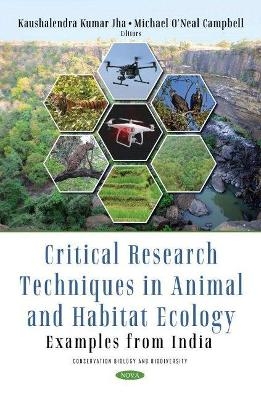This book covers selected topics on research methods in modern ecology, through the lens of 8 chapters, focusing on animal ecology, landcover assessment and habitat change, human perspectives and management, and research techniques, with examples taken from the Indian subcontinent. This area has emerged as one of the pivotal zones where cutting edge applications may be tested. Topics examined include the development and management of computer software techniques and the syntheses of these into pre-existing research methods, chemical analyses, including studies of animal dietary and foraging patterns, landcover, habitat and plant ecological change and even human/animal relations, and genetic studies. Remote sensing and geographical information systems are considered as cutting-edge research methods, at small, medium and large-scale levels, including more accurate positioning systems, more sensitive tracking systems, the removal of obstacles to clearer observation and species identification, such as darkness and poor lighting, dense vegetation and coarse image resolution and more comparative studies across different local contexts and global ecosystems. The topics cover geoinformatics applications to forest management in India, the paradigm shifts in this area, and the promotion and integration of sustainable forest management (SFM) and geoinformatics within the National Working Plan Code. Another case study is of Geoinformatics, Climate Change, Habitat Dynamics and a Case of Vultures in Central India, focusing on vulture ecology and related climatic variables, assessed with geoinformatics, Species Distribution Models (SDMs) and Global Circulation Models (GCMs). Other topics concern the use of tracking technologies including drones, the use of thermal and infrared drones in the study of large mammalian carnivores, the role of remote sensing and GIS in the assessment of natural resource development, clustering around the central concept of change detection, and the monitoring of agricultural development using socio-cultural parameters. This book presents these issues as some factors among the vast number of current ecological issues.
Michael ONeal Campbell, PhD. Lecturer, Simon Fraser University, BC, Canada
Preface; Forest Management in India: A Paradigm Shift and the Use of Geoinformatics; Biogeography as an Ecological Science and Methodology; Landuse-Landcover Dynamics Analysis using Remote Sensing and GIS: A Case of Central Himalayan Terai, India; Geoinformatics, Climate Change, Habitat Dynamics and a Case of Vultures in Central India; A Symbiosis of Habitat Conservation and Eco-Tourism Development: A Case Study of the Valmiki Tiger Reserve, India; Technology in Good Governance: A Case of FRA and Geoinformatics; Similar Yet Different Rice-Farming Ecosystems: UNESCO Associated Cases of Two Culturally Rich Asian Nations; Thermal Drones and Large Mammalian Carnivores; Rehabilitation of Mine Spoils: A Review on Problems and Strategies with Cases of Indian Mines; What could be the Present and Future Habitats of Residents and Wintering Vultures for Conservation in the Indian Subcontinent; Index.



